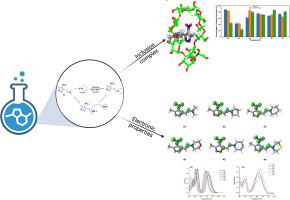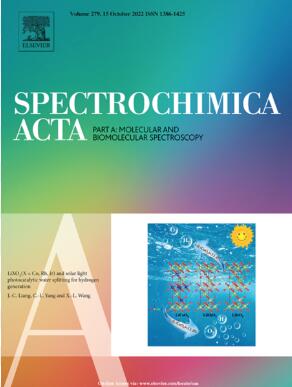硝基异恶唑的光谱和非线性光学研究:与β-环糊精的主客体相互作用和dft支持的稳定性分析
IF 4.6
2区 化学
Q1 SPECTROSCOPY
Spectrochimica Acta Part A: Molecular and Biomolecular Spectroscopy
Pub Date : 2025-10-05
DOI:10.1016/j.saa.2025.126984
引用次数: 0
摘要
合成了6个乙烯基功能化的硝基异恶唑衍生物(A1-A6)并进行了结构表征,其中化合物A6为首次报道。采用紫外可见光谱、1H NMR(包括T₁和T₂弛豫时间)和热力学分析研究了它们与β-环糊精(β-CD)的包合作用。利用Job’s和Benesi-Hildebrand方法确认了络合物的形成,在整个系列中观察到自发结合(ΔG:−3.73 -4.01 kcal/mol)。A3(哌啶)和A2(吡咯烷)的亲和度最高,分别主要由熵和焓贡献驱动。核磁共振数据支持在所有情况下异恶唑部分通过β-CD更宽的边缘轴向插入。通过DFT (m06 - 2x / 6-311 ++G(d,p))评价了游离化合物的电子和非线性光学(NLO)性质,揭示了杂环取代基调节了电子亲和性和亲电性。所有衍生物都显示出良好的NLO响应,突出了它们在光电材料设计中的潜力。在Vero细胞中进行的细胞毒性实验表明,所有化合物在400 μM时毒性均较低,β-CD包封后毒性进一步降低。这些结果表明,β-CD络合可以有效地调节硝基异恶唑的物理化学、光学、电子和生物学性质,支持其在超分子体系和功能光学材料中的应用。本文章由计算机程序翻译,如有差异,请以英文原文为准。

Spectroscopic and nonlinear optical investigations of nitroisoxazoles: host–guest interactions with β-cyclodextrin and DFT-supported stability analysis
Six vinyl-functionalized nitroisoxazole derivatives (A1–A6) were synthesized and structurally characterized, including the first report of compound A6. Their inclusion complexation with β-cyclodextrin (β-CD) was investigated using UV–Vis spectroscopy, 1H NMR (including T₁ and T₂ relaxation times), and thermodynamic analyses. Complex formation was confirmed using Job's and Benesi–Hildebrand methods, with spontaneous binding observed across the series (ΔG: −3.73 –4.01 kcal/mol). A3 (piperidine) and A2 (pyrrolidine) exhibited the highest affinities, which were predominantly driven by entropic and enthalpic contributions, respectively. NMR data supported the axial insertion of the isoxazole moiety through the wider rim of β-CD in all cases. The electronic and nonlinear optical (NLO) properties of the free compounds were evaluated via DFT (M06-2×/6–311++G(d,p)), revealing that heterocyclic substituents modulate electron affinity and electrophilicity. All the derivatives displayed promising NLO responses, highlighting their potential for optoelectronic material design. The cytotoxicity assays in Vero cells showed low toxicity at 400 μM for all compounds, which further decreased upon β-CD encapsulation. These findings demonstrated that β-CD complexation can effectively modulate the physicochemical, optical, electronic, and biological properties of nitroisoxazoles, supporting their application in supramolecular systems and functional optical materials.
求助全文
通过发布文献求助,成功后即可免费获取论文全文。
去求助
来源期刊
CiteScore
8.40
自引率
11.40%
发文量
1364
审稿时长
40 days
期刊介绍:
Spectrochimica Acta, Part A: Molecular and Biomolecular Spectroscopy (SAA) is an interdisciplinary journal which spans from basic to applied aspects of optical spectroscopy in chemistry, medicine, biology, and materials science.
The journal publishes original scientific papers that feature high-quality spectroscopic data and analysis. From the broad range of optical spectroscopies, the emphasis is on electronic, vibrational or rotational spectra of molecules, rather than on spectroscopy based on magnetic moments.
Criteria for publication in SAA are novelty, uniqueness, and outstanding quality. Routine applications of spectroscopic techniques and computational methods are not appropriate.
Topics of particular interest of Spectrochimica Acta Part A include, but are not limited to:
Spectroscopy and dynamics of bioanalytical, biomedical, environmental, and atmospheric sciences,
Novel experimental techniques or instrumentation for molecular spectroscopy,
Novel theoretical and computational methods,
Novel applications in photochemistry and photobiology,
Novel interpretational approaches as well as advances in data analysis based on electronic or vibrational spectroscopy.

 求助内容:
求助内容: 应助结果提醒方式:
应助结果提醒方式:


